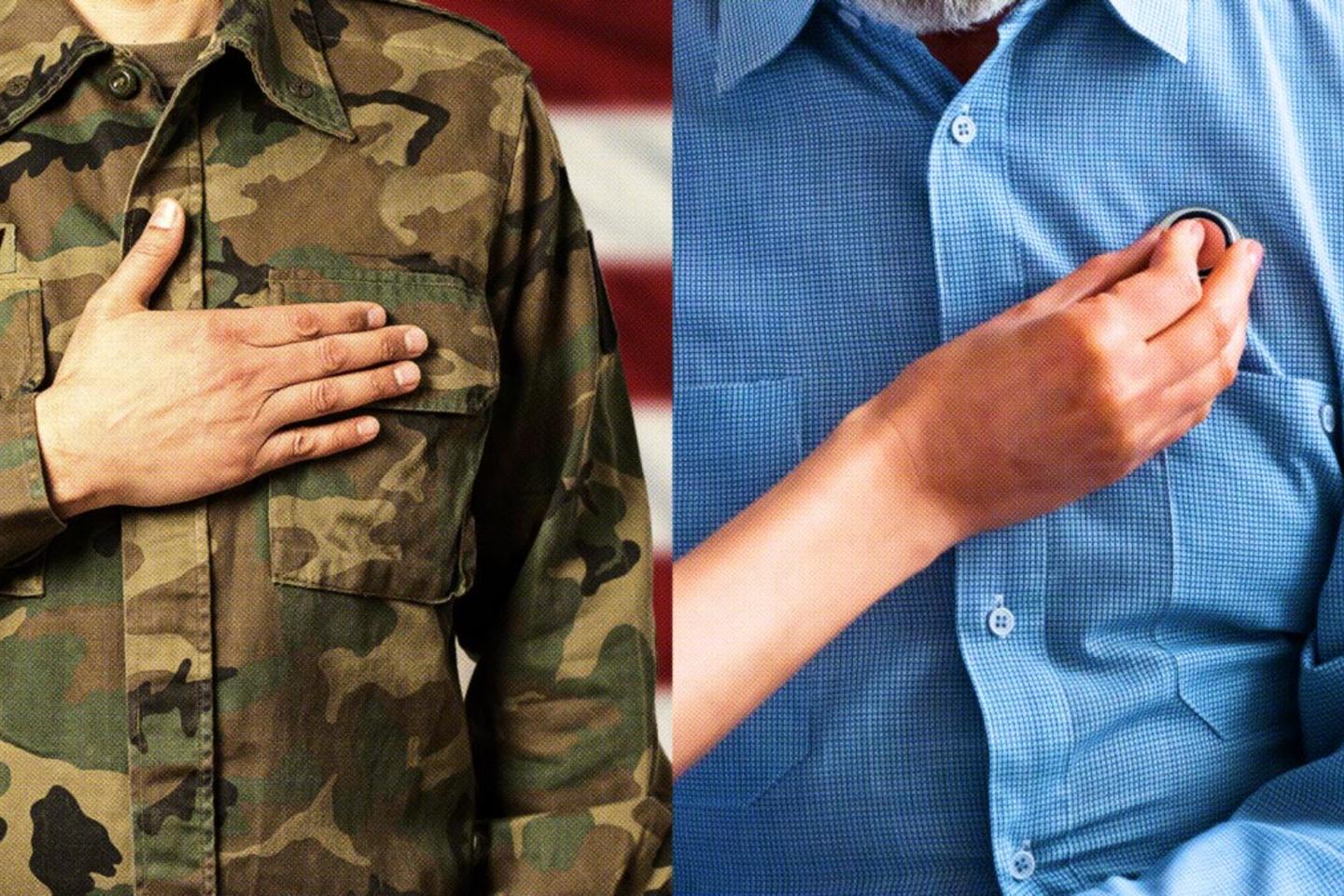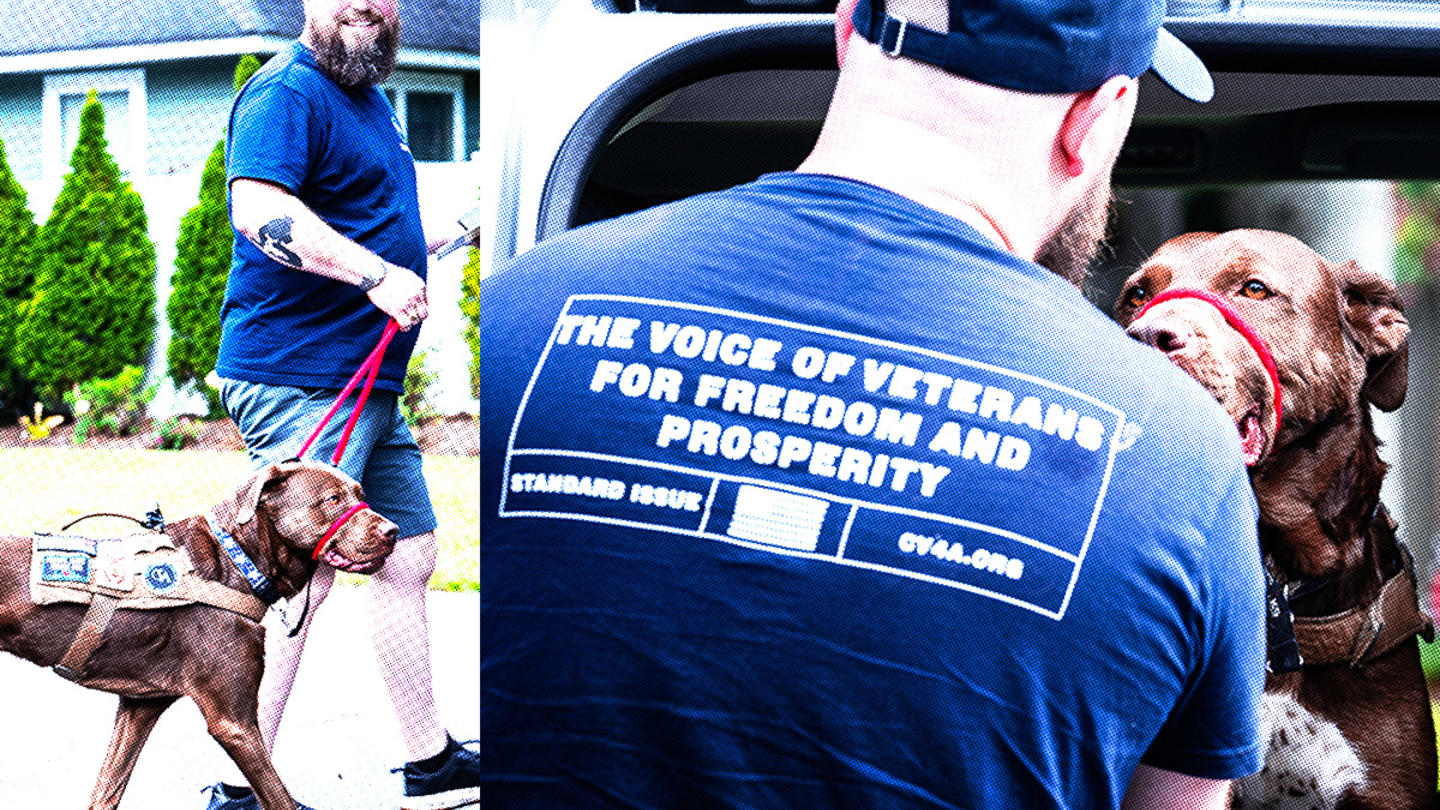George Rice came home from Afghanistan a hero, but problems with the VA health care system didn't make him feel like one.
"Everyone signs up for different reasons," says George Rice. "I was playing college football when 9/11 happened. I witnessed everything unfold and I was — like a lot of young Americans at that time — motivated to serve and fight."
Rice ended up dropping out of college to join the Army's late entry program in 2001. Two deployments each to Iraq and Afghanistan, plus multiple Purple Hearts later, he was ready to return to the U.S. By 2010, he had a newborn son and wanted to get back to a life of stability.
Upon his arrival back home to the Rio Grande Valley in Texas, he found that life would only get more chaotic as a returned veteran. There was a six month delay in the GI Bill kicking in, leaving him and his family without steady income. They quickly ended up homeless, with Rice working three jobs simultaneously.
What was more, his access to health care through the U.S. Department of Veterans Affairs (VA) left him seriously lacking. Rice eventually ended up pulling himself and his family out of homelessness and now operates his own business, through which he can access more health care options than the VA provides.
Unfortunately, Rice's story is all too familiar to many veterans. More than two decades of war in Iraq and Afghanistan have left millions with serious physical and psychological wounds that require regular and personalized treatment. Yet many veterans return to the U.S. only to find such treatment is deeply lacking within the VA health care system. George Rice was able to build the support system he needed for himself — and now, together with Concerned Veterans for America, he's advocating for fellow veterans to be able to have the same level of autonomy over their health.
VA health care system problems leave many veterans dependent on themselves instead
"It was a very, very difficult transition for me," recalls Rice. "There weren't really many support networks out there."
After returning home to Texas, he went from soldier to veteran. At first, steady income was hard to come by, and he and his wife and son were routinely evicted from their apartments. At one point, Rice lived out of the back of his pickup truck at a nearby state park.
While trying to find regular work and housing, he was also grappling with the aftermath of nearly a decade of active combat. But he found that the VA health care system placed little trust in the ability of veterans to voice or direct their own health decisions.
For instance, Rice had been shot and needed a reconstruction of his entire shoulder. The VA would not recognize the severity of his problem and approve the procedure until the ligaments and tendons had almost completely detached.
Although he had been privately diagnosed as having PTSD, the VA re-diagnosed him with the lighter "post-deployment anxiety." He was sent to a treatment group that he eventually stopped attending, finding himself placed alongside others who had never experienced close-quarters combat and could not empathize with his trauma. The only medication he was offered was high-intensity psychiatric prescriptions, which were more powerful and risked more side effects than were necessary to meet his needs.
"I realized what I needed, and that I wasn't going to get the help I needed," he says. "I realized I [could] not be dependent on these benefits at all."
He began to rely on himself rather than the VA. To be able to secure private health care, he worked as a contractor helping maintain levees; a bouncer at a downtown club; and founded a weapon training company, all at once. He often worked 100-hour weeks, saving up to be able to move his family into a new home.
It was only once he sought out private medical treatment that he was able to voice his concerns and symptoms, and have them be listened to and taken seriously.
"It was shocking to me that you had to fight tooth and nail to get the benefits that you earned and that you paid for, not just financially … but that you paid for with sweat and blood," he says.
VA health care system problems could be facing a momentous turning point
There are currently about 19 million veterans in the United States. Approximately 9 million of those veterans are enrolled in the VA health care system and a little over 7 million men and women rely on it for treatment on a regular basis.
"When you include family members, you're talking about 5-6% of the general population that's being affected," says John Byrnes, a fellow Iraq War veteran and Deputy Director for Concerned Veterans for America.
According to Rice, many veterans have to travel 100 miles just to get a flu shot, due to the lack of accessible VA health care providers. The VA often either over-prescribes dosages or prescribes medication that is too intense for the conditions being treated, often with a side-effect of heightened suicide risk. This leaves many, like Rice, with no other choice but to abandon the VA system altogether and seek out private treatment for themselves.
But VA health care is on a possible precipice of change. Concerned Veterans for America's 2023 policy agenda includes pushing for passing the Veterans' True Choice Act and the Veterans Health Care Freedom Act. Both reforms would provide veterans' greater choice and flexibility in selecting healthcare providers, thus increasing their ability to access timelier and higher-quality care.
Though the VA Mission Act was passed in 2018 with the aim of granting greater healthcare choice to millions of veterans, USA Today found that the VA is "using improper methods to calculate wait times … denying community care … canceling and rescheduling appointments and failing to offer community care alternatives, actively dissuading veterans from choosing community options, overriding clinician community care referral recommendations, and using cost to determine whether to refer a patient out to the community."
Additionally, Concerned Veterans for America is currently pushing for the passing of The Modernizing Veterans' Health Care Eligibility Act, which would create a bipartisan panel holding the VA accountable for providing accessible veteran treatment.
With the 2024 presidential election year fast approaching, the window for enacting meaningful policy reforms will effectively close this year, making now a critical time to spread awareness of the VA health care system's deficiencies.
Breaking barriers to health care for veterans begins with giving veterans the trust to determine their own treatment
After years of pain and tumult, George Rice considers himself very fortunate to now be at a place in life where is able to "worry about other people more than myself."
About four years ago, he founded 5x5 Brewing Company in Mission, Texas. The company is veteran-owned and operated, providing them with not only a steady paycheck, but the ability to pursue private health care as well.
Rice hopes for a world in which this is the norm, rather than the exception. He is a vocal advocate for removing government control over veteran health care, and instead allowing returned soldiers to have autonomy over their health care treatment and decisions. He characterizes this as "veteran exceptionalism over veteran victimization."
"Right now, the VA and civilians … breed into that culture of veteran victimization, where you're broken, you're a victim of circumstance," he says. "I'm like, 'No, I'm not a victim. I want to be elevated. I want to do bigger things. I want our community to get involved with policy. I want our community leading … Unfortunately most veterans now get labeled as broken or deficient, and that's not the case."
Learn more about Stand Together's health care reform efforts.




